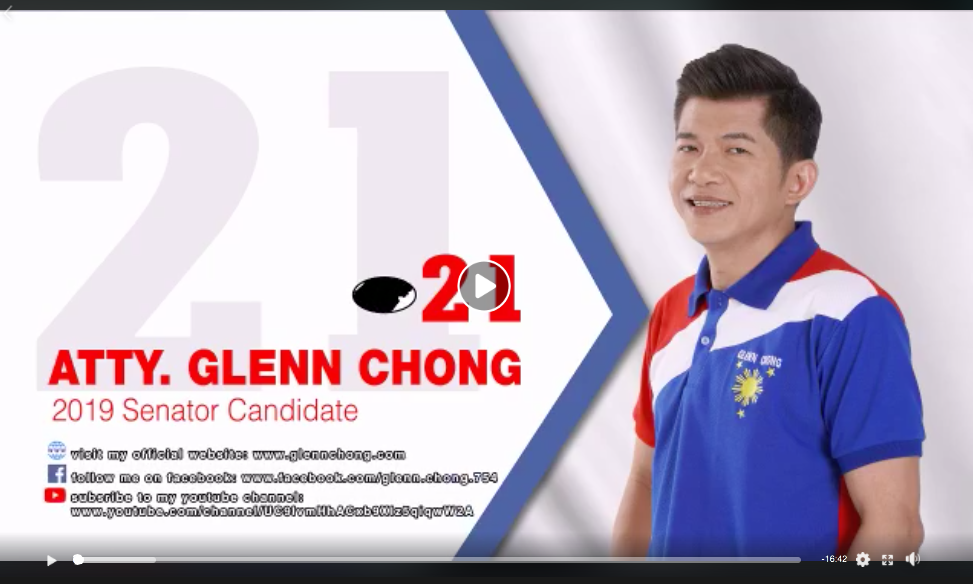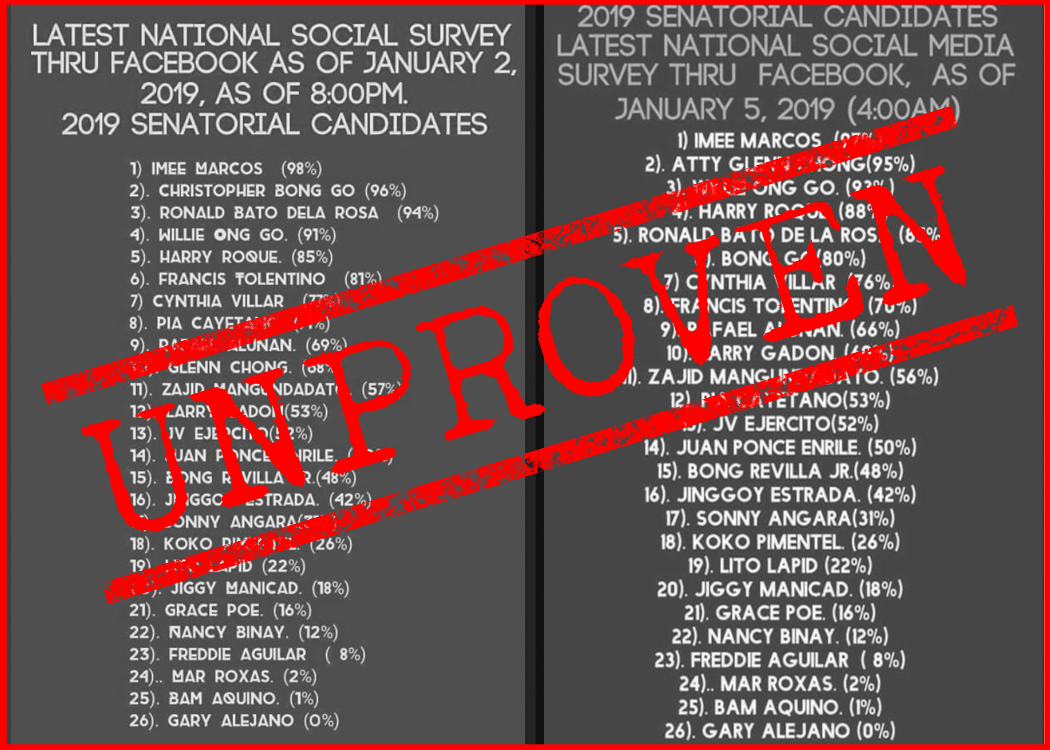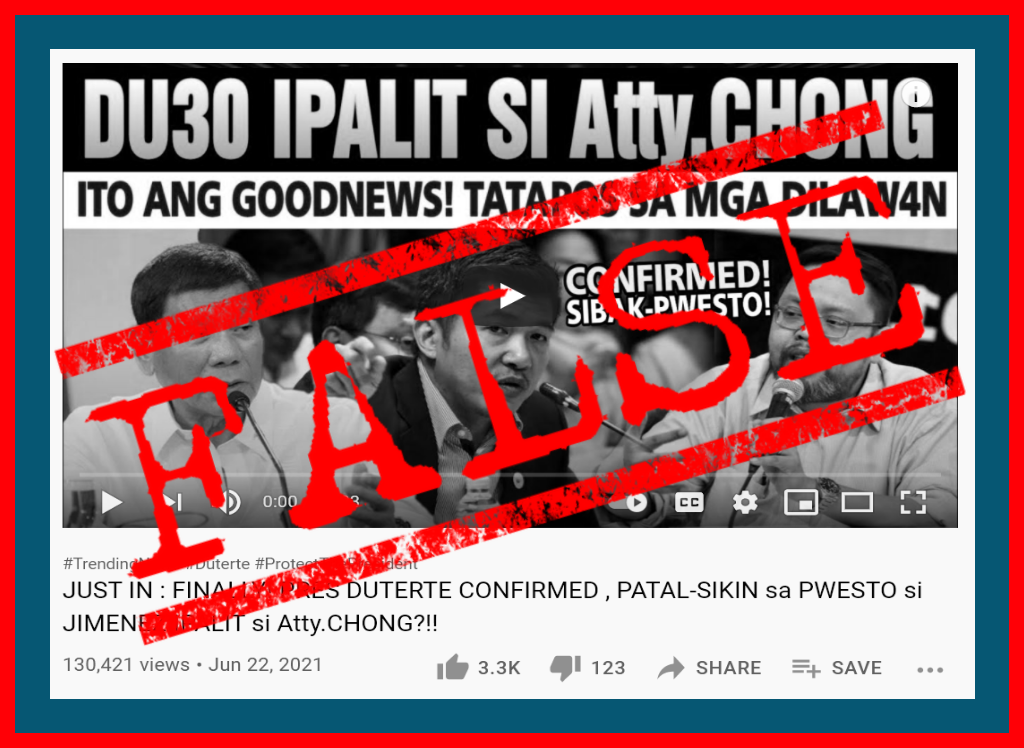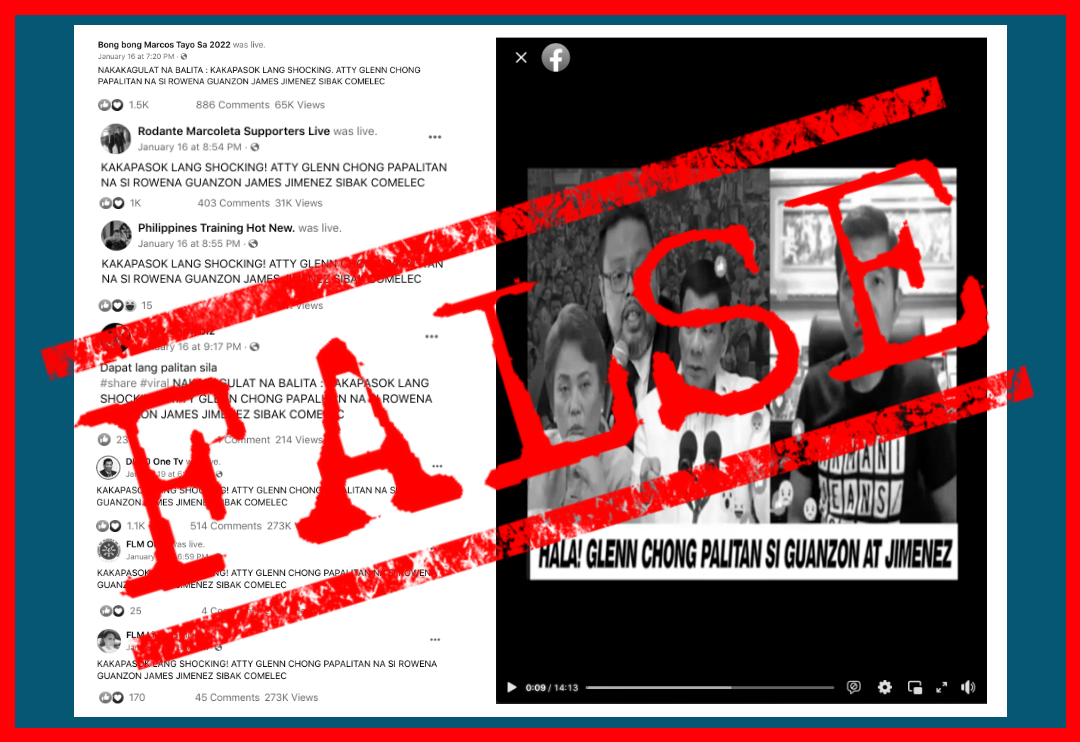Senatorial candidate Glenn Chong urged voters to use an ultraviolet (UV) light camera simulator that could detect “pre-shaded” ballots–an advice based on false information.
STATEMENT
On May 11, the last day of the campaign, Chong in a 16-minute live Facebook video talked about the issue of pre-shaded ballots tackled in a staged video that trended two weeks prior. The ballot in the video, where ovals for Otso Diretso candidates were supposedly marked with UV ink, is fake.
While Chong said he could not ascertain whether the already debunked viral video was legitimate, he proposed that voters download a mobile application called “UV Flashlight Camera Simulator,” which he said was recommended by the International Police of Norway:
“I-download po natin ang app na ito, 15 mb lang po siya. At kapag nag-on na po ‘yung application, pindutin niyo po yung play. Play kasi it’s a simulation, tapos lalabas po ‘yung screen na ganito, at i-go over niyo po sa balota para makita po ninyo kung may shade na ito o wala.
(Let’s download this application, it’s only 15 mb. Once it’s turned on, click play, because it’s a simulation. This will appear on your screen, then [use it to] go over your ballot to see if it’s shaded or not.)”
Source: Glenn Chong’s Facebook page, May 11, 2019, watch from 10:03 to 10:20
Earlier, he explained that if the vote counting machine (VCM) can read the UV watermark security feature of the ballot, it can also process ovals that have been pre-shaded with UV ink:
“Kapag nabasa po ng makina ang ultraviolet ink na watermark sa bandang gitna, sa itaas ng balota, hindi po nakikita ng ating mga mata ‘iyan. Posible pong mabasa din ng makina ang ultraviolet ink na ginamit pag shade po ng mga ovals ng mga kandidatong gustong mandaya.
(If the machine can read the watermark in ultraviolent ink at the top-middle area of the ballot–this isn’t visible to the naked eye–it’s possible that it would be able to read the ultraviolet ink used to shade the ovals of the candidates who want to cheat.)”
Source: Glenn Chong’s Facebook page, May 11, 2019, watch from 6:38 to 7:00
Chong said a Commission on Elections official confirmed it could be possible. He then urged voters to scan their ballots using the UV camera before voting.
FACT
The use of mobile phones as “capturing devices” inside the polling precinct is considered unlawful, according to a 2016 Comelec resolution. More, the Comelec has already belied allegations of pre-shaded ballots.
Comelec Executive Director Jose Tolentino told reporters May 2 that the VCM does not count UV marks as votes, but looks for black ink:
“So we tested. Eh hindi naman binabasa ng VCM iyon (The VCM does not read that). The VCM actually looks for black ink. ‘Yung talagang (The black) ink, hindi (not) invisible.”
Sources: Pilipino Star Ngayon, Inquirer.net, Manila Bulletin
UV marks are flagged by the VCMs as a security feature, to ensure the authenticity of official ballots, Tolentino said in an Inquirer report. Poll watchdog Parish Pastoral Council for Responsible Voting (PPCRV) said a ballot is fake when the scanner does not detect a UV mark on it, and/or when the ballot has a different type of barcode than the one specified for the election.
Even if a voter downloads the UV camera application, not all phone cameras can detect UV light, with low-cost UV sensors for phones only being recently developed. Others may also need to attach an external device for their phones to be capable of sensing UV light.
The application promoted by Chong also has mostly negative feedback from users according to Google Play Store–getting mostly one-star ratings. One former user even warned others from downloading the app because it asks users to allow the app to “share (their) personal information.”
Chong’s video, which has been posted 277 times by pages including MOCHA USON BLOG Group, Maharlika and ATTY. GLENN CHONG, got more than 54,000 views and 3,104 shares and could have reached some 4.8 million people.
Sources
Adafruit Industries, Analog UV Light Sensor Breakout – GUVA-S12SD
Commission on Elections, Resolution No. 10088, s. 2016, April 12, 2016
Google Play, UV Flashlight Camera Simulator
Inquirer.net, ‘Obviously staged,’ says Comelec exec on video showing ‘pre-shaded ballots’, May 2, 2019
Philstar.com, Pre-shaded ballot pinabulaanan ng Comelec, May 3, 2019
PPCRV Antipolo Diocese, VCM Demonstration 2019 National and Local Elections
Manila Bulletin, Commission on Elections tells public to not believe video showing alleged pre-shaded ballot, May 2, 2019
Tohoku University, Ultraviolet light sensor for wearable devices in the IoT era, April 17, 2017
US National Library of Medicine National Institutes of Health, Ultraviolet Imaging with Low Cost Smartphone Sensors: Development and Application of a Raspberry Pi-Based UV Camera, Oct. 6, 2016
(Guided by the code of principles of the International Fact-Checking Network at Poynter, VERA Files tracks the false claims, flip-flops, misleading statements of public officials and figures, and debunks them with factual evidence. Find out more about this initiative and our methodology.)
(VERA Files is a part of Tsek.ph, a collaborative fact-checking initiative by the academe and the media for the 2019 Philippine midterm elections.)




